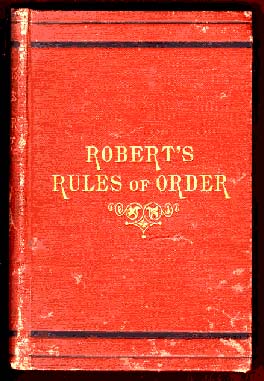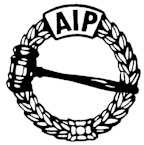Related Research Articles
A deliberative assembly is a meeting of members who use parliamentary procedure.

Robert's Rules of Order, often simply referred to as Robert's Rules, is a manual of parliamentary procedure by U.S. Army officer Henry Martyn Robert. "The object of Rules of Order is to assist an assembly to accomplish the work for which it was designed [...] Where there is no law [...] there is the least of real liberty." The term Robert's Rules of Order is also used more generically to refer to any of the more recent editions, by various editors and authors, based on any of Robert's original editions, and the term is used more generically in the United States to refer to parliamentary procedure. It was written primarily to help guide voluntary associations in their operations of governance.

Parliamentary procedures are the accepted rules, ethics, and customs governing meetings of an assembly or organization. Their object is to allow orderly deliberation upon questions of interest to the organization and thus to arrive at the sense or the will of the majority of the assembly upon these questions. Self-governing organizations follow parliamentary procedure to debate and reach group decisions, usually by vote, with the least possible friction.

Minutes, also known as minutes of meeting, protocols or, informally, notes, are the instant written record of a meeting or hearing. They typically describe the events of the meeting and may include a list of attendees, a statement of the activities considered by the participants, and related responses or decisions for the activities.
An agenda is a list of meeting activities in the order in which they are to be taken up, beginning with the call to order and ending with adjournment. It usually includes one or more specific items of business to be acted upon. It may, but is not required to, include specific times for one or more activities. An agenda may also be called a docket, schedule, or calendar. It may also contain a listing of an order of business.

The American Institute of Parliamentarians (AIP) is a not-for-profit educational organization founded in 1958. The objectives of AIP are to promote the use and teaching of parliamentary procedure, as well as the training and certification of parliamentarians.
A parliamentary authority is a book of rules for conducting business in deliberative assemblies. Several different books have been used by legislative assemblies and by organizations' deliberative bodies.
In US parliamentary procedure, the previous question is generally used as a motion to end debate on a pending proposal and bring it to an immediate vote. The meaning of this specialized motion has nothing to do with any question previously considered by the assembly.
Deliberative assemblies – bodies that use parliamentary procedure to arrive at decisions – use several methods of voting on motions. The regular methods of voting in such bodies are a voice vote, a rising vote, and a show of hands. Additional forms of voting include a recorded vote and balloting.
In certain countries, a motion in parliamentary procedure is a formal proposal by a member of a deliberative assembly that the assembly take certain action. Such motions, and the form they take are specified by the deliberate assembly and/or a pre-agreed volume detailing parliamentary procedure, such as Robert's Rules of Order; The Standard Code of Parliamentary Procedure; or Lord Citrine's The ABC of Chairmanship. Motions are used in conducting business in almost all legislative bodies worldwide, and are used in meetings of many church vestries, corporate boards, and fraternal organizations.
In United States parliamentary procedure, a suspension of the rules allows a deliberative assembly to set aside its normal rules to do something that it could not do otherwise. However, there are rules that cannot be suspended.
Debate in parliamentary procedure refers to discussion on the merits of a pending question; that is, whether it should or should not be agreed to. It is also commonly referred to as "discussion".
In a deliberative assembly, disciplinary procedures are used to punish members for violating the rules of the assembly.
In parliamentary procedure, requests and inquiries are motions used by members of a deliberative assembly to obtain information or to do or have something done that requires permission of the assembly. Except for a request to be excused from a duty, these requests and inquiries are not debatable nor amendable.
The history of parliamentary procedure refers to the origins and evolution of parliamentary law used by deliberative assemblies.
In parliamentary procedure, the verb to table has the opposite meaning in the United States from that of the rest of the world:
The floor of a legislature or chamber is the place where members sit and make speeches. When a person is speaking there formally, they are said to have the floor. The House of Commons and the House of Lords of the United Kingdom; the U.S. House of Representatives and the U.S. Senate all have "floors" with established procedures and protocols.
The clerk, chief clerk, secretary, or secretarygeneral of a legislative chamber is the senior administrative officer responsible for ensuring that its business runs smoothly. This may encompass keeping custody of documents lain before the house, received, or produced; making records of proceedings; allocating office space; enrolling of members, and administering an oath of office. During the first sitting of a newly elected legislature, or when the current presiding officer steps down, they may act as the presiding officer in the election of a new presiding officer such as the speaker or president. The clerk in some cases has a ceremonial role. A clerk may also advise the speaker or members on parliamentary procedure, acting in American parlance as a "parliamentarian".
The American College of Parliamentary Lawyers (ACPL) is a professional association of lawyers from the United States and Canada.
References
- 1 2 National Conference of State Legislatures (2000). Mason's Manual of Legislative Procedure, 2000 ed., p. 430
- ↑ "California State Legislature – Leadership and Caucuses". www.legislature.ca.gov. Retrieved 2016-01-12.
Chief Clerk – A nonpartisan, nonmember officer of the Assembly elected by the majority of the membership at the start of each two-year session as its legislative officer and parliamentarian.
- ↑ "General Assembly". www.pacapitol.com. Retrieved 2016-01-12.
- ↑ "Rules of Order > Chapter 3: Officers". senate.la.gov. Retrieved 2016-01-12.
- ↑ Palmer, Brian (2010-03-18). "So, You Want To Be a Parliamentarian?". Slate. ISSN 1091-2339 . Retrieved 2016-01-12.
- ↑ "National Association of Parliamentarians » FAQ". www.parliamentarians.org. Retrieved 2016-01-12.
- ↑ Robert, Henry M.; et al. (2011). Robert's Rules of Order Newly Revised (11th ed.). Philadelphia, PA: Da Capo Press. pp. 556, 566–67. ISBN 978-0-306-82020-5.
- 1 2 Robert 2011 , p. 466
- ↑ Robert 2011 , p. 465
- ↑ Robert III, Henry M.; et al. (2011). Robert's Rules of Order Newly Revised In Brief (2nd ed.). Philadelphia, PA: Da Capo Press. p. 95. ISBN 978-0-306-82019-9.
- ↑ Koh, Elizabeth (27 June 2013). "Texplainer: What Does the Parliamentarian Do?". The Texas Tribune. Retrieved 2016-01-12.
- 1 2 Robert 2011 , p. 467
- ↑ "National Association of Parliamentarians » Types of NAP Membership". www.parliamentarians.org. Retrieved 2016-01-12.
- ↑ "Certification - American Institute of Parliamentarians". American Institute of Parliamentarians. Archived from the original on 2015-09-27. Retrieved 2016-01-12.